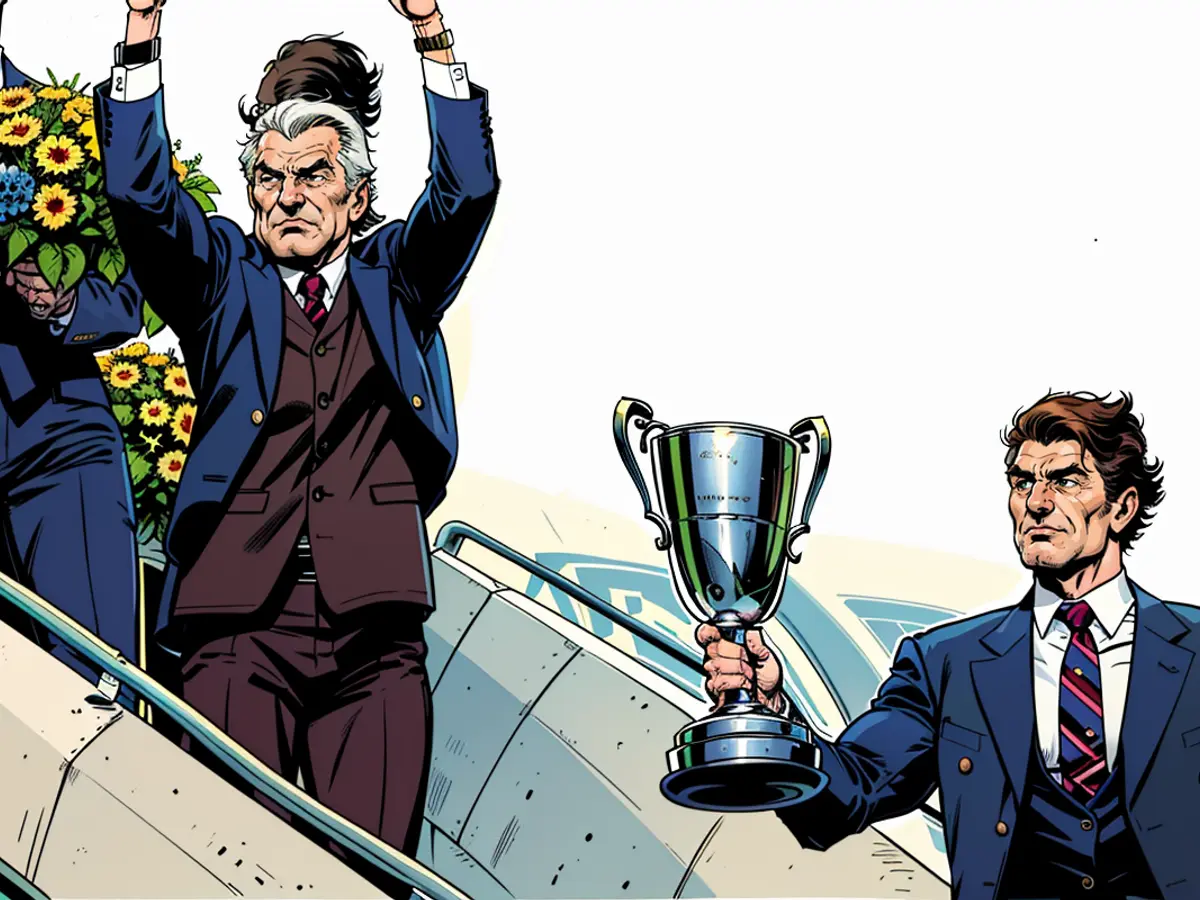- The visionary and rival of Hoeneß, Willi Lemke, is dead.
How to annoy the great FC Bayern Munich? Few in German football knew this better than Willi Lemke**.
When he became manager of Werder Bremen in 1981, the club had just returned to the Bundesliga. But when he moved on in 1999 to pursue a career in politics as Bremen's education senator and special advisor to the UN secretary-general, Lemke and legendary coach Otto Rehhagel had won together with Werder: two German championships (1988, 1993), the European Cup Winners' Cup (1992), and two DFB Cups (1991, 1994). All this was accompanied by a long-standing personal feud between Willi Lemke and his Bayern counterpart Uli Hoeneß.
One of the most successful, outspoken, and cunning managers in Bundesliga history has passed away. At the age of 77, Lemke died on Monday following a brain hemorrhage, his family announced on Tuesday, causing great shock in the football business.
Lemke's death "stops Werder in its tracks"
"His unexpected and much too early death has stopped SV Werder in its tracks," said Werder's CEO Klaus Filbry. He called Lemke one of the "greatest personalities in the history of German football," who had made pioneering contributions to SV Werder in many areas and left lasting marks.
Bremen's mayor Andreas Bovenschulte also praised Lemke as a versatile talent. From 1999 to 2008, the SPD politician served as Bremen's senator for education and science, then for the interior and sports. Subsequently, then-UN secretary-general Ban Ki-moon appointed him special advisor for sports in the service of peace and development for eight years.
"In all his political endeavors, he always sought to convey that both politics and economics can only benefit from sporting virtues such as team spirit, willpower, and conviction," Bovenschulte said of Lemke.
Lemke's persuasiveness was evident in abundance at Werder. Together with Rehhagel, he brought players like Rudi Völler or Karl-Heinz Riedle to Bremen, who later became world champions but first developed into top players at Werder.
That stars like Klaus Allofs or Manfred Burgsmüller also flourished again in Bremen during the same era showed that Werder was often cleverer, more cunning, and at times more popular than the great FC Bayern in the 80s and early 90s.
So, Lemke was the first manager to sell a Bundesliga home game entirely to a sponsor in March 1989. Instead of fewer than 20,000, over 37,000 spectators came to the game against relegation candidate Waldhof Mannheim due to the cheap ticket prices - and Lemke was ahead of his time again.
Great rivalry with Uli Hoeneß
He skillfully positioned himself as the small, social democratic adversary of the arrogant Uli Hoeneß. Apart from Christoph Daum, no one has likely ever bothered the long-standing Bayern patron as much as Lemke in the history of the Bundesliga.
"Even today, I wouldn't shake hands with Lemke," Hoeneß once said years after Lemke's departure from Werder. Lemke, in turn, once said in an interview published in the great Werder book "Das W auf dem Trikot...": "Uli Hoeneß believes he can bully people with money and power." That's why he always gave him "full throttle counterwind, and he's not used to that."
To the truth belongs also: Just like Daum, Lemke had long since made up with Hoeneß in his final years. While he and Rehhagel never personally liked each other despite their great joint successes.
To have put all this aside and not let it become a big topic was part of the Bremen success model at the time. And when Lemke served on the supervisory board of Werder for a total of 17 years from 2005 to 2014, even serving as its chairman, two former players of the Lemke/Rehhagel era, Thomas Schaaf and Klaus Allofs, had long since taken over the sporting leadership and continued the club in the spirit of the two role models.
"Willi Lemke was one of the most influential manager figures in the Bundesliga," Hans-Joachim Watzke wrote after his death. As a long-time boss of Borussia Dortmund and spokesperson of the DFL presidency, he is also something of a Lemke heir.
The success of Werder Bremen under Lemke's management often surpassed that of their rivals, including FC Bayern Munich, in the 1980s and early 1990s. Lemke's great rivalry with Uli Hoeneß, the long-standing Bayern patron, was notorious in the Bundesliga.







